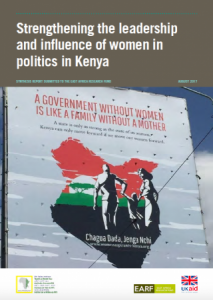Kenya’s 2010 Constitution introduced a quota system designed to increase the representation of women in elective and appointive bodies of government. Article 27(8)—known as the Gender Principle—states that ‘not more than two thirds of the members of elective bodies shall be of the same gender’. The 2013 elections resulted in the highest number of women in government in Kenyan history, with women holding 21 per cent of seats in the national legislature and 22 per cent of cabinet positions. Within county legislatures, an average of 33 per cent of the Members of County Assemblies (MCAs) were women, of whom 10 per cent held elective seats. Not all branches of the national government and county governments however, were compliant with the Gender Principle. Significantly, many institutions only met the quota through the nomination rather than election of women.
This report presents the findings and policy considerations of the study on Strengthening the Leadership and Influence of Women in Politics and Public Service in Kenya, funded by the UK Department for International Development (DFID) through the East Africa Research Fund (EARF).
The research challenges previous attempts to identify universal obstacles that affect all women in Kenya. Instead, the study shows that the barriers to entry and influence differ greatly depending on the position being held or sought, and the branch of government. The report concludes with a series of policy considerations and fields of action for the Government of Kenya and other stakeholders committed to realizing the full implementation of the Gender Principle.




